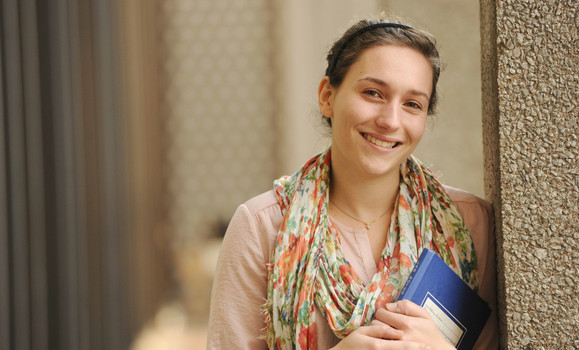At first glance, it may seem like a degree in Microbiology & Immunology and a degree in Creative Writing are worlds apart. But Brittany Graham, Dal’s newest Rhodes Scholar, has always been good at finding connections.
“For me, writing is a way to slow down and think about what’s going on,” explains Brittany, chatting with Dal News less than 48 hours after receiving her life-changing news. “As a student in Science it can be easy to bury your head in a textbook, but as a writer you need to be aware of what’s going on in the world. You learn to see the world through other people’s perspectives.”
That desire to learn about other perspectives has taken Brittany from First Nations communities in northern Ontario to rural Panama, and next year will take her to Oxford, England.
Yesterday, Brittany was announced as one of Canada‚Äôs 11 Rhodes Scholars for 2015. With the backing of one of the most prestigious fellowships in the world, she‚Äôll be able to travel to and study at Oxford University for two years, with an option for a third. Her selection makes her ƒ¢πΩAV‚Äôs 89th Rhodes Scholar and the third in as many years, following and .
Hearing the news
Brittany, who is originally from Ottawa, spent Friday and Saturday in Charlottetown, PEI. There, as one of the Rhodes finalists for the Maritime region, she was put through a speedy, intense series of interviews.
“Right before the interviews, I felt like it was such a long shot that I wasn’t as nervous as I thought I would be,” she says, reflecting on the experience. “I think that actually worked in my favour, because I was able to answer the questions honestly, just be myself, and not overthink it.”
It was Saturday evening that she got the call telling her she’d been selected as a Rhodes Scholar — late enough that her parents, who are currently living in Germany, could have been forgiven for being asleep. They weren’t: they were even more excited than their daughter, who was almost too in shock for the news to register.
“I was in a general state of disbelief,” she says. “Even when I found out I was going to get an interview, it didn’t seem like a real possibility at all.”
Bridging interests
Brittany is a stellar student, with an impressive GPA and several scholarships to her name during her time at Dal. In her Creative Writing major, she‚Äôs won Dal‚Äôs top awards in both poetry and short story writing and served as managing editor of Fathom, ƒ¢πΩAV‚Äôs literary journal.
“The first time I tried to write a novel I was in grade four,” she says. “It was about time machines, and it was long: a full notebook, and all the characters were named after my friends. I’ve just always thought of myself as a writer.”

But in high school, her passion for writing was matched by her interest in science‚Äôs potential to solve some of the world‚Äôs pressing problems. It was the ƒ¢πΩAV Integrated Science Program (DISP) that drew her to Halifax and, eventually, charted a path to Dr. Craig McCormick‚Äôs lab in the Department of Microbiology and Immunology. There, she spent a summer working on herpes viruses thanks to an NSERC Undergraduate Research Award and subsequently started her honours thesis studying influenza.
"Brittany is a very special, very talented student," says Dr. McCormick, explaining that the research projects she's worked on as an undergrad are directly at the heart of his lab's groundbreaking research into diseases like influenza.
"From our very first meeting, she had a maturity and a command of situations at a very high level. She was already operating at a graduate level as a 20-year-old undergraduate... She's the kind of person who is going to be successful at whatever she directs herself towards in life."
Though Brittany didn’t intend to pursue a dual degree when she started at Dal, she found herself missing her creative pursuits after her DISP experience. Reaching out to faculty in the Creative Writing program, she was able to broaden her studies into a cross-discipline double major.
“In my Science classes, when we’re learning about bacteria and viruses and how they work, the focus is on the microbes and not on the people or communities being affected," she explains. "We don’t necessarily discuss how some of these diseases, like cholera or tuberculosis, primarily affect people in disadvantaged communities or developing countries. Because of Creative Writing, and the broader perspective it gives me, I think about my Science classes differently.”
Local and global perspectives
That “broader perspective” is something that the Rhodes Trust looks for when selecting candidates for its scholarships. Rhodes Scholars must demonstrate character, commitment to others and the potential to become a world leader.
“I love school, and it would be very easy for me to just do school all the time; in my first year, that’s sort of what I did, and I was happy,” says Brittany. “But to be connected to the community and to some of the other issues I’m passionate about, exploring the larger world outside of class — that’s what volunteering offers me.”
An avid camper and skier, Brittany’s extracurricular activities including tutoring high school students and leading recreational activities for veterans at Camp Hill Hospital. With Global Brigades — a student-led international non-profit — she travelled to rural Panama this past summer, contributing to a medical clinic and building composting latrines. (She’s helping plan a water brigade mission to Honduras this August.)
Her trip to Panama took place right on the heels of her spending two months as an Aboriginal Summer Reading Camp Leader. In the Eabametoong First Nation in Ontario, 400 kilometres north of Thunder Bay, she ran literacy activities for youth.
“I was really impressed by how warmly I was welcomed into the community. I didn’t expect to feel so at home there,” she says. “I came away from the experience amazed by how supportive the community was.”
Looking ahead
Those experiences helped inform where Brittany wants to take her studies at Oxford: further into the human experience of disease and health. She plans to apply for Oxford’s Global Health Science program, which tackles some of the issues she’s interested in at an epidemiological level.
“It’s a step out of my comfort zone, and a bit unfamiliar, but it’s a way for me to learn more about the people at the heart of discussions about disease. Especially in Canada, looking at the health disparities between Aboriginal and non-Aboriginal Canadians, I want to have the academic background to explore these complex issues.”
In fact, her current plan after Oxford is to return to Canada to complete her MD and, then, to work up North in remote communities. It’s yet another way she hopes to find connections between her interests.
“It’s about doing things I care about,” says Brittany. “That’s what’s important.”

